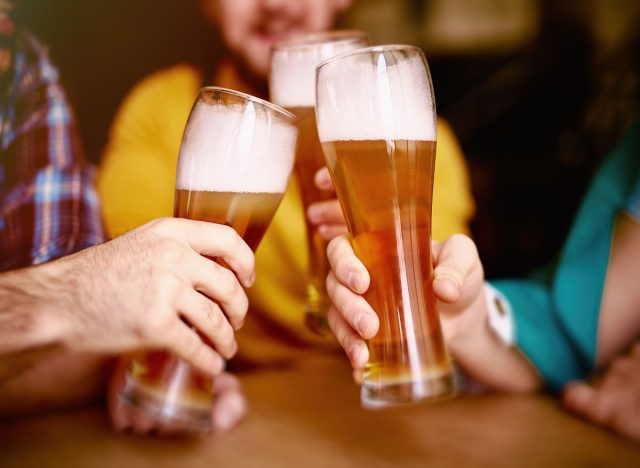The #1 Drink This Man Had Until He Was 110

It seems as if when we age, we come with inevitable ailments, which is why it’s important to take care of ourselves to ensure we reach our golden years safely, healthily, and happily. For some, it’s maintaining a workout routine, for others, it’s ensuring a healthy diet, or it’s a mix of all of the above. However, it’s rare to hear about alcoholic drinks that help people achieve high ages.
It’s common to want to unwind with a glass of alcohol after a long day, and it is possible that moderate alcohol consumption can reduce the enormity of a person’s response to stress. Nebraska-native Mark Behrends took that to his advantage as he lived to be 110. According to an article posted in TIME, one of the reasons Behrends lived to be that long was his daily can of beer.
Lois Bassinger, Behrend’s daughter, was quoted as saying “he always told everybody the reason he has lived so long is drinking one can of beer, every day at 3 p.m.”
Red wine is the alcohol typically known for its benefits when enjoyed in moderation—and typically enjoyed by the longest living people in the world. However, while a glass of red wine is full of antioxidants that can help reduce the risk of chronic diseases, beer is known to have some advantages as well.
According to the American Journal of Medicinal Sciences, beer contains more protein and B vitamins than wine. Beer has the equivalent amount of antioxidants as wine, but the specific antioxidants are different because the barley and hops used in the production of beer contain different types of flavonoids (a group of plant metabolites that provide health benefits) compared to red wine.
In research posted by BioFactors, a series of studies using animal models have shown that beer may prevent carcinogenesis—the initiation of cancer formation—and osteoporosis, a condition in which bones become weak and brittle.
The research showed that beer provides plasma, which has significant protection from oxidative stress. The beverage also contains isohumulones (the bitter substances derived from hops), which may prevent and improve obesity and type-2 diabetes, improve lipid metabolism, and suppress atherosclerosis—a disease of the arteries characterized by the deposition of plaques of fatty material on their inner walls. Moderate beer drinking has also been linked to decreasing cardiovascular risk and overall mortality.

Although beer provides surprising benefits, it’s important to remember to drink in moderation, as too much alcohol can correlate to negative effects. You could become dehydrated, gain belly fat, and develop problems such as circulatory issues, ulcers, and diabetes.
Researchers who were published in the Nutrients Journals suggest that an approximate consumption of 10 to 16 grams of alcohol per day, equivalent to one beer for women could be defined as moderate beer drinking. For men, it would be about 20 to 28 grams of alcohol per day, equaling one to two beers. However, the consumption would be distributed throughout the week with no heavy episodic or “binge drinking” on a single occasion, especially during weekends.
It is also suggested that moderate beer drinking should be considered consumed during mealtimes, as the custom in Mediterranean countries.
Pick the perfect can with these 15 Best Light Beers You’ve Never Heard Of (But Need to Try!)








